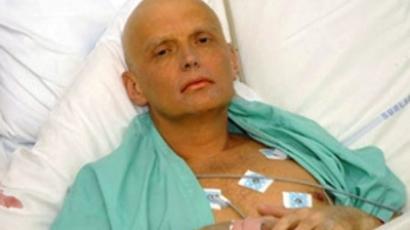Polonium not detected? Russian suspect cleared of charges
German prosecutors have dropped all charges of illegally trafficking nuclear materials against Dmitry Kovtun, who was linked to the murder of former Russian security officer Aleksander Litvinenko in London in 2006.
That's according to his lawyer, Wolfgang Vehlow.
On Wednesday, Vehlow received a written notification from the prosecutor’s office in Hamburg that Kovtun’s case had been closed and the investigation stopped.
Kovtun: “The charges were nonsense”
"I was ready for the case to be closed,” Kovtun told RT. “I heard rumors a month ago, but I was waiting for written proof. And now my lawyer in Germany has it and I will receive it tomorrow. I was accused of illegal transportation of nuclear materials – this is nonsense; it’s like accusing someone of transporting swine flu, for example."
The German prosecution filed a criminal case against the Russian businessman, who was suspected of smuggling nuclear materials after traces of polonium 210 were reportedly found at his house in 2006.
Kovtun was one of the three people who visited Litvinenko in the London hotel Millennium on the day Litvinenko was allegedly poisoned. This led to media suspicions of his participation in Litvinenko’s murder, but Kovtun was never officially accused in the poisoning.
He was questioned in connection with the case by British investigators, but the businessman denied any involvement in Litvinenko’s death and said he himself was a victim of poisoning. After his return from London, Kovtun was hospitalized with symptoms of poisoning by nuclear materials similar to those that killed Litvinenko. Russia’s Prosecutor General’s Office opened a criminal investigation into his attempted murder.
Andrey Lugovoy, who was Kovtun’s business partner and is now a Russian State Deputy, remains Britain’s main suspect in the Litvinenko murder case. London continues to demand his extradition, with Russia continuously refusing the requests, saying his extradition would go against the constitution of the country.
UK to follow Germany?
"The case against me and against Andrey Lugovoy was a bit too thin and doctored up by certain circles in England, and, as the German experience shows, fell apart like a snowball when examined impartially," Kovtun said after hearing the latest news.
"The decision of the German prosecutor's office is not only the first step toward full rehabilitation of me and Andrey Lugovoy, it has also taken a cornerstone out of the charges against Andrey Lugovoy in England that will also collapse as the Berlin Wall did," Kovtun added.
Andrey Lugovoy personally thinks the decision by the German prosecutors could affect his own case.
“It is hard to say what kind of radical changes this decision will lead to, but I can say for sure it pulls the rug from under the feet of the British investigation", Lugovoy said.
"Now they have to seriously think and restart the investigation in closer cooperation with us. In the last three-and-a-half years British investigators met with me only once – in December of 2006. I would not even call it an interrogation – it was more like a talk that lasted three hours. I do not know how they could have drawn any conclusions about me from that meeting.”
Lugovoy's lawyer, Andrey Romashov, agreed with his client's assessment.
"Clearly, this decision to drop charges against Kovtun in Germany is a positive move,” Romashov said. "Apparently, people understood over time that we were right because this [case against Kovtun] was one of the elements of the British investigation plan that was based on the radioactive material transportation route. Now we can see that it is not so at all.”
Programme Director of German Council on Foreign Relations Alexander Rahr believes that the German decision on the Kovtun case will probably also help to improve political relations between London and Moscow.
"If the Germans say they do not want to have Kovtun in prison or have him extradited to Germany, then for the same reason Britain can also say no to its former claims,” Rahr said.
Russian officials have suggested several times to Britian to present evidence of Lugovoy’s guilt, so that they can conduct an investigation in Russia. But Britian has yet to do that, according to Russian law enforcement. During the three years since the former Russian security officer died in London, British officials have yet to officially declare a cause of death, or to publish results from the autopsy.














